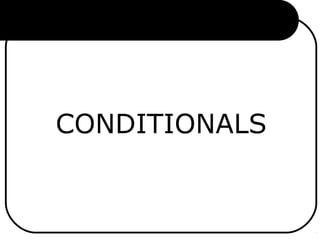
Conditionals from Teacher John's Class
- 1. CONDITIONALS
- 2. ZERO CONDITIONAL If you don’t water flowers, they die. If you have a headache, stop watching TV. With zero conditional we express a general truth or we give advice. If clause: PRESENT SIMPLE Main clause: PRESENT SIMPLE or IMPERATIVE
- 3. FIRST CONDITIONAL If the weather is nice, we will go for a walk. If you don’t apologize, she will never trust you again. The first conditional refers to the present and future. It expresses a possible condition and its probable result in the future. If clause: PRESENT SIMPLE Main clause: FUTURE SIMPLE
- 4. Jack wants to buy a house but he can’t do this because he doesn’t have any money. If I had a lot of money, I would buy a big house. SECOND CONDITIONAL
- 5. Susan wants to phone Paul but she can’t do this because she doesn’t know his number. If I knew his number, I would phone him. SECOND CONDITIONAL
- 6. If I had a lot of money, I would buy a big house. If I knew his number, I would phone him. if-clause: PAST TENSE SIMPLE main clause: PRESENT CONDITIONAL would + infinitive SECOND CONDITIONAL The second conditional refers to the present and future. It expresses an unreal situation and its probable result. The situation or condition is improbable, impossible, imaginary, or contrary to known facts.
- 7. FIRST v. SECOND CONDITIONAL THE DIFFERENCE: FIRST and SECOND CONDITIONAL Both conditionals refer to the present and future. The difference is about probability, not time. First conditional: real and possible situations Second conditional: unlikely to happen If John runs fast, he will win the race. If John ran fast, he would win the race. This is still possible to happen. This is unlikely to happen because John doesn’t run fast.
- 8. THIRD CONDITIONAL Jack wanted to buy a house last year but he couldn’t do that because he didn’t have any money. If I had had a lot of money, I would have bought a big house.
- 9. THIRD CONDITIONAL Yesterday, Susan wanted to phone Paul but she couldn’t do that because she didn’t know his number. If I had known his number, I would have phoned him.
- 10. THIRD CONDITIONAL If I had had a lot of money, I would have bought a big house. If I had known his number, I would have phoned him. if-clause: PAST PERFECT SIMPLE main clause: PAST CONDITIONAL would + have + past participle The third conditional refers to the past and it is not based on facts. It expresses the a situation which is contrary to reality in the past.
- 11. SECOND v. THIRD CONDITIONAL THE DIFFERENCE: SECOND and THIRD CONDITIONAL The difference is about time. Second conditional: refers to the present and future Third conditional: refers to the past situations If I saw a car accident, I would call an ambulance. If I had seen a car accident, I would have called an ambulance. But I don’t see an accident now. This is unlikely to happen. But I didn’t see an accident yesterday. This is contrary to the fact in the past.
- 12. ALL CONDITIONALS 0. If he drives carefully, he avoids the accident. General time reference. 1. If he drives carefully, he will avoid the accident tomorrow. This is still possible to happen. 2. If he drove carefully, he would avoid the accident today. But he doesn’t drive carefully. This is unlikely to happen. 3. If he had driven carefully, he would have avoided the accident yesterday. But he didn’t drive carefully, so he didn’t avoid the accident.
- 13. THE END
